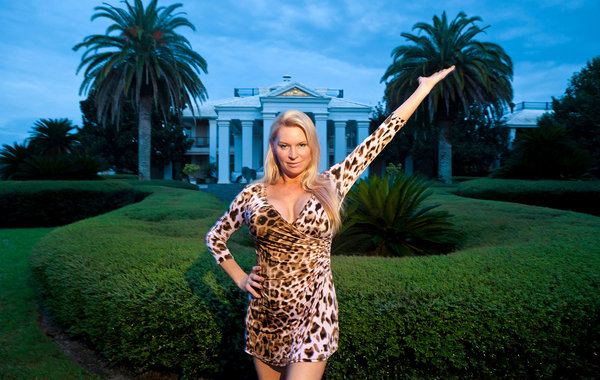Directed by Lauren Greenfield
USA, 2012
Anyone who believes excess is the American way would find the new documentary The Queen of Versailles to be a rock-solid example of their point. The film chronicles the last few years in the lives of David and Jacqueline Siegel, who endeavored to build and live in the biggest single-family home in the United States, clocking in at just about 90,000 square feet. (They couldn’t go for a cool 100,000? Where’s the ambition?) Because the Siegels made their fortune in the world of real estate, though, their story takes a disastrous turn after the financial world is rocked in the fall of 2008 by plummeting stock prices. What was once meant to be a simple, shocking story of unfettered greed turns into an equally astonishing riches-to-rags tale.
Director and producer Lauren Greenfield doesn’t bring a flashy or stylish feel to the proceedings, but she doesn’t need to. The Siegels, particularly wife Jackie, don’t need any gaudy cinematic tricks to spruce up their insane and jaw-dropping lifestyle, listed out early in the film. From the number of rooms in their old house to what they’ll upgrade to in the new mansion—complete with 10 (10!) kitchens—it’s clear that the Siegels are primed to be taken down a peg or two. When the market goes belly-up, David is hit extremely hard, as he’s the founder, president, and CEO of the world’s largest timeshare company. Greenfield doesn’t have to foreshadow the strife the Siegels will soon experience; we know from the get-go that they won’t be living large for much longer, even as they flaunt their wealth.
Though the title character of the film is Jackie, Greenfield is wise to not focus solely on how she’s coping with the way her life has turned around so rapidly, giving time to David and his business. Still, Jackie’s contradictory nature—a former IBM engineer turned seemingly stereotypical young blonde trophy wife—makes her uniquely compelling. She’s scarily reminiscent of the character Jennifer Coolidge portrayed in the Christopher Guest comedy Best in Show, lacking in self-awareness as she drives around the Orlando, Florida area with her eight children and nannies. The zenith (or nadir, depending on how you look at it) of her self-absorbed nature is when, at a rental-car service she’s using to stick to a lower budget, she innocently asks who her driver will be.
Something Greenfield could’ve improved upon is a more coherent, cohesive timeline. In an early scene, we see David presenting the Miss America Foundation with a $25,000 check, dated August of 2009. But soon after, we’re watching a montage of news footage covering the Wall Street meltdown of September 2008, and yet the film doesn’t imply that we’ve jumped back in time. The events Greenfield covers extend to the summer of 2011, but she avoids emphasizing exact dates or times. Every once in a while, we see a season or specific event tied to a time of year, like a low-key and not very festive Christmas party. Still, if the audience had a better sense of the financial strife the Siegels were experiencing and when they were experiencing it, it would make the film more potent.
Greenfield is lucky, though, in that the Siegels and their mind-boggling avarice, by itself, is fascinating in a train-wreck kind of way. Somehow, the mansion where the Siegels are living as the film begins grows more and more garish once they realize they’re stuck there for the foreseeable future. Greenfield lays it on thick by showing us repeated shots of dog feces (the Siegels have a lot of dogs who apparently don’t get walked enough), emphasizing the squalor in which this family has found itself. But the drastic shift in their lives is fascinating. One compelling subplot follows the trials and tribulations of Siegel’s timeshare company and Las Vegas hotel property. We don’t get many chances to see how the world outside of the Siegel family perceives their extravagant wealth, but even watching David’s son and the timeshare-company employees struggle to have a normal day’s work with the threat of layoffs weighing over their heads is insightful and engrossing.
The Queen of Versailles is designed to make you angry, or shocked, or bewildered. You may laugh during the film, but rarely because of an intentional joke (though a throwaway gag with one of the Siegel kids doing a pratfall works, simply for being unexpected). No, you’ll laugh because you can’t believe what you’re seeing. The supreme level of childlike ineptitude from Jackie and David Siegel, their unrepentant and unaware nature to how the rest of humanity perceives them, is staggering. It’s a head-shaking film, but a pertinent and cautious reminder: you may want more in your life, but sometimes when you get it, you don’t know when to stop. Jackie and David Siegel have that problem, and though The Queen of Versailles is well-made, it’s important to watch this movie and do the exact opposite of everything they’ve done.
– Josh Spiegel




